Integrating Originality with Academic Standards in Topic Selection
Introduction
Choosing a project topic for your IGNOU MCom coursework in 2025 demands a delicate balance between creativity and academic depth. A distinctive topic can make your project shine, while adherence to research standards ensures it meets the expectations of the MCOP-001 course. By integrating creative approaches with structured analysis, you can create a project that is both impactful and credible. This article explores how to achieve this balance to pick a winning topic for your 2025 MCom project.
Why Originality Matters
Originality in your project topic distinguishes your work from others, making it more notable to faculty. A novel topic highlights your ability to think independently, which is a key skill in the academic sphere. For example, instead of a generic topic like “Employee Retention,” you could explore “Technology-Based Employee Engagement Strategies in 2025,” adding a modern twist that engages attention.
Nevertheless, innovation must be rooted in academic depth. A topic that is too far-fetched may lack the credibility needed to meet MCOP-001 standards. Your goal is to select a topic that is fresh yet feasible, ensuring it can be supported by evidence.
The Role of Scholarly Standards
Academic depth refers to the structured approach required for your MCom project. The MCOP-001 guidelines stress that topics must be defined, practical, and pertinent to commerce fields like marketing. This means your topic should allow for structured investigation, supported by credible sources.
For example, a topic like “Impact of Digital Transformation on Retail Banking” is rigorous because it requires case studies, such as market trends. Your faculty advisor will expect a topic that reflects your ability to investigate a defined issue using research techniques.
Combining Innovation with Rigor
To balance originality with academic rigor, start by identifying a general area of interest within your MCom curriculum, such as finance. Then, incorporate a novel angle that reflects 2025 innovations. For instance, instead of a common topic like “Financial Performance Analysis,” you could choose “Influence of Blockchain on Financial Transparency in Indian Banks,” which is both original and practical.
Consult with your faculty mentor to ensure your topic meets MCOP-001 requirements. They can help you narrow your idea to keep its originality while ensuring it is structured. For instance, if you’re interested in sustainability, they might suggest “Environmental Costing Practices in Indian SMEs” to keep the topic manageable.
Choosing Fresh Ideas
One issue in achieving creativity is avoiding repetitive topics. Many students gravitate toward generic topics like “Employee Motivation” or “Financial Ratios,” which can make your project seem ordinary. To stand out, rework these topics with a 2025 twist. For case, instead of “Employee Motivation,” explore “Influence of Hybrid Work Models on Employee Engagement in 2025,” incorporating emerging workplace trends.
Research 2025 industry reports to discover novel ideas. For instance, a topic like “Role of AI in Customer Relationship Management” is distinctive because it taps into digital transformation, a trending topic in 2025, while remaining feasible with case studies.
Checking Practicality
A original topic must also be doable within the scope of the MCOP-001 project. This means ensuring access to data sources, such as surveys. For instance, a topic like “Customer Trends in E-Commerce Post-2025” is practical because you can collect data through questionnaires, whereas a topic requiring confidential data may be difficult.
Talk to your faculty mentor to evaluate the feasibility of your topic. They can recommend adjustments to ensure your innovative idea is viable. For instance, if you propose “Influence of Quantum Computing on Finance,” they might suggest narrowing it to “Significance of AI in Financial Forecasting” due to research feasibility.
Adding a Modern Twist
To enhance originality, incorporate 2025 innovations into your topic. Review market analyses from sources like NASSCOM to discover emerging issues like sustainability. For example, a topic like “Influence of FinTech on Rural Banking in India” is unique because it merges a emerging technology with a specific context, ensuring both innovation and standards.
Another popular area is eco-friendly practices. A topic like “Green Accounting in Indian Corporations” is fresh and allows for case studies, meeting the course requirements of MCOP-001.
Engaging with Advisors
Your faculty advisor plays a key role in integrating innovation with depth. Consult with them early to refine your topic. For example, if you propose a creative topic like “Effect of Virtual Reality in Retail Marketing,” they might suggest focusing on “Augmented Reality in E-Commerce” to ensure practicality.
Be receptive to their recommendations, as they can help you maintain the creative spark while ensuring your topic aligns with course guidelines. Regular collaboration with your guide ensures your project is both distinctive and credible.
Highlighting Your Expertise
A well-balanced topic allows you to highlight your capabilities in commerce. For example, a topic like “Significance of Data Analytics in Supply Chain Optimization” lets you exhibit your ability to interpret business processes, blending creativity with research standards. This can engage evaluators and hiring managers.
Moreover, a innovative topic can lead to presentations in academic forums, enhancing your professional profile.
Conclusion
Balancing creativity with academic depth is the key to choosing a successful Ignou handwritten project MCom project topic for 2025. By reframing standard topics with a 2025 perspective, including trends like AI, and consulting your faculty guide, you can create a project that is both unique and robust. Topics like “Sustainable Finance” can highlight your expertise while meeting MCOP-001 requirements. Start early, use your originality, and deliver a impressive MCom project in 2025.
